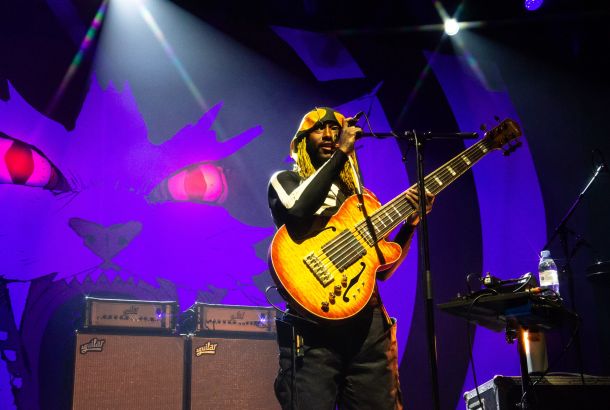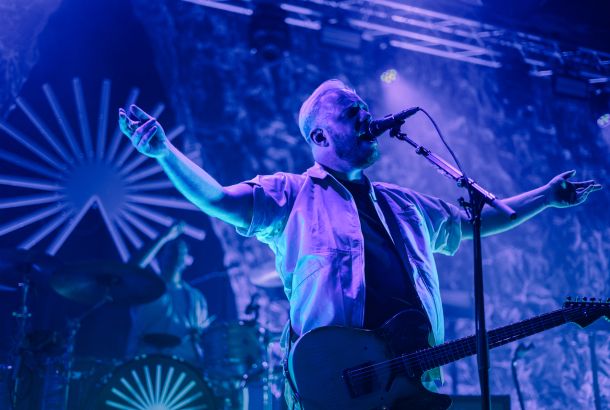Interview: Gary Numan
By Tom Ingham
Do you think you could have evoked such drama and been able to set your dystopian scenes [in early albums like Replicas] as a straight up punk band, or is the guitar too confined as an instrument?
Some of the songs on Replicas are more guitar than synth strangely enough but, overall, I don’t think the albums would have been anywhere near as effective without the synths. I love the guitar, and it can be processed in ways that can make it sound very unusual, but it can’t compete with synths for sound design. It was the synth that allowed me to expand ny sound beyond the punk band that I used to be.
What are your thoughts on the statement that The Pleasure Principle gave birth to 1980s? And how does that make you feel looking back on that decade?
I had Replicas and The Pleasure Principle both go to Number 1 in the UK in 1979 so electronic music was given a high level launch into the public’s consciousness via those two albums. It encouraged all the big labels to start signing electronic acts when they hadn’t been overly interested before, it encouraged people to start making electronic music of their own and it opened up doors of opportunity for those people that were already dabbling with it. In that sense I suppose I paved the way for some of what came along in the 1980’s and beyond. It’s something to be proud of I but, in truth, I don’t really think about it. I have never been one for looking back, either on successes or mistakes. I have always been almost obsessively focused
on where I’m going next. Tomorrow is exciting, yesterday is over and done with.
https://www.youtube.com/watch?v=Uu6MDdxBork
How did the Saturday Night Live performance change your career, and did you know before the show it would have such immediate effects?
It made me an overnight star in the US so it had an enormous effect. I went to America essentially unknown, I did that show and the next morning it seemed that everyone in America knew who I was. It was incredible. I knew before I went there that it was a big show but I had no idea just how powerful it was.
Thinking of tracks like Metal, those warm synth bass lines are becoming very fashionable once again – do you think an 80s ‘revival’ to some extent is on the cards?
I hope not. I hate revivals. Music should be about creating new things, and that’s especially true of electronic music. I have never seen any point in looking backwards for inspiration if all you do with it is to repeat something that’s already been done. Surely we should be trying to
create new sounds and come up with new ideas, things people haven’t heard before. I find it almost depressing to think that music may actually go in cycles where every few decades we repeat an older one. Whatever the truth of that it holds no interest for me. My reason for being a songwriter and musician is to keep moving forward musically, to keep coming up with new ideas, new sounds, and using new technology.
On the face of it, Splinter is a very heavy, industrial and quite dark album in places; why did you write such a record? And does From A Broken Mind reflect where you were at the time of writing?
I was diagnosed with depression in 2008. I didn’t write a song for over three years and things were falling apart somewhat, career, private life, pretty much everything really. The cure was almost as bad as it sucks you into this permanent state of ‘couldn’t care less’. So, you’re no longer ‘depressed’ but now you don’t care about anything so you still don’t work. It took a few big shocks to make me begin to realise that I needed to come back to the real world. When I did the urge to start writing again came back and the most powerful thing that had happened had been fighting the depression, so I wanted to write about that. I was broken in a very real sense and it took a long time to fix. The album title is very accurate.
What made you want to become a stunt pilot?
I have always loved aeroplanes and I learnt to fly when I was quite young. As in most things I have an obsessive tendency, due to my Aspergers Syndrome I expect, and so with aeroplanes I wanted to learn how to control them to an ever greater degree. That took me into historic
aeroplanes and then in to aerobatic and then formation aerobatic flying. I became an Evaluator at one point for the Civil Aviation Authority. Part of it was the simple pleasure of being able to handle aeroplanes well; good enough to be a display pilot for about fifteen years, but also it was dangerous and so very exciting. Unfortunately most of my friends were killed in various accidents over the years so, when my children started to be born, I decided to
stop display flying. It seemed too reckless a thing to do as a hobby once I had a family of my own. I do miss it though.
I’d like to end on a broad, slightly philosophical question if you don’t mind: How has fame affected you; are you grateful for your time in the limelight or has it been overwhelming?
It was pretty overwhelming when it first happened. It was very sudden and I became globally massive almost overnight. It’s a lot to take in and you can only adapt to such huge changes over time. These days I can barely remember what it was like before the success, I’ve been doing this my entire adult life so I don’t know another way. I don’t think it’s affected me that much at all though to be honest. I’m very grounded, very down to earth. I have no diva in me, I’m polite, I don’t expect anyone to run around for me, I treat everyone fairly, I just think of myself as being very lucky; just that, lucky, not special. There are so many pop stars and rock stars and great songwriters and performers, we really are a very disposable thing. So many people can do what we do, we should never think of ourselves as being special because we’ve been lucky enough to sell a few records now and then.







